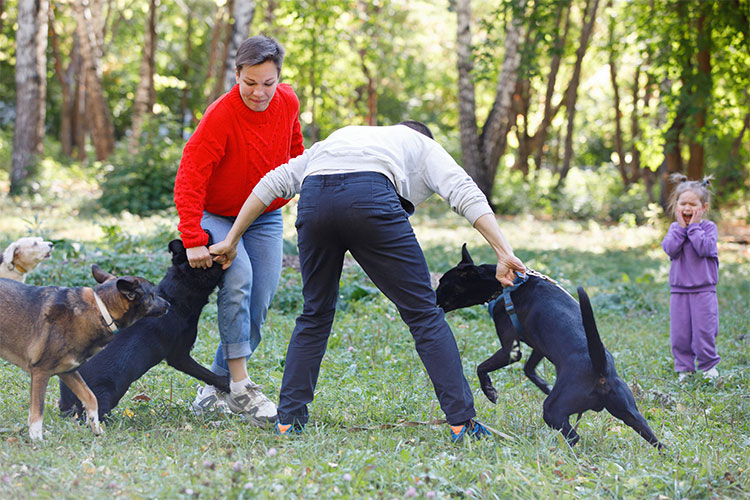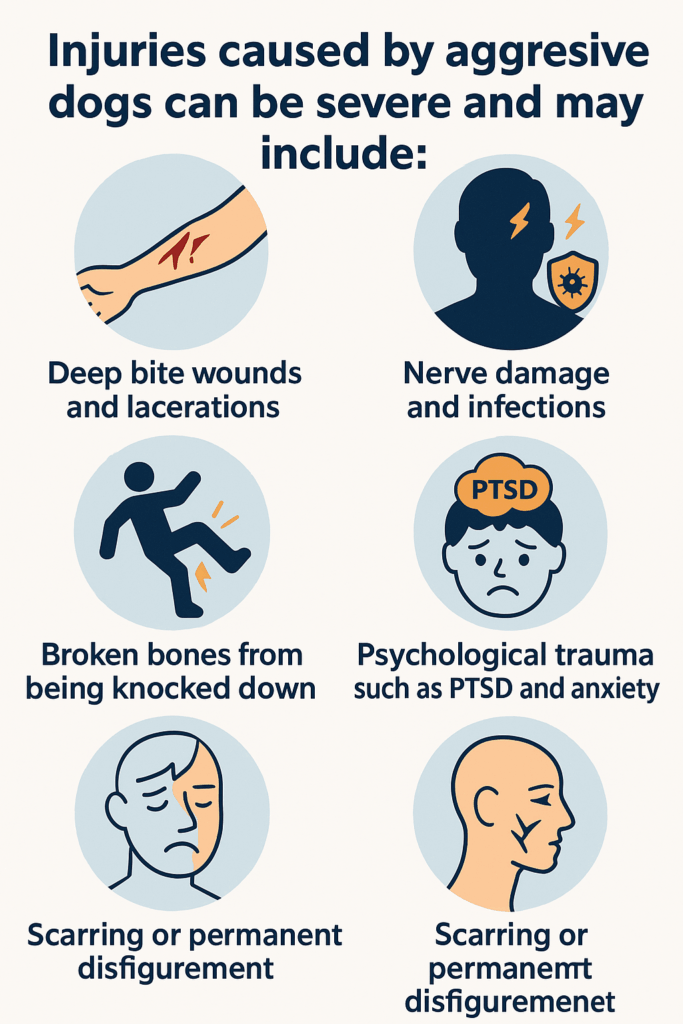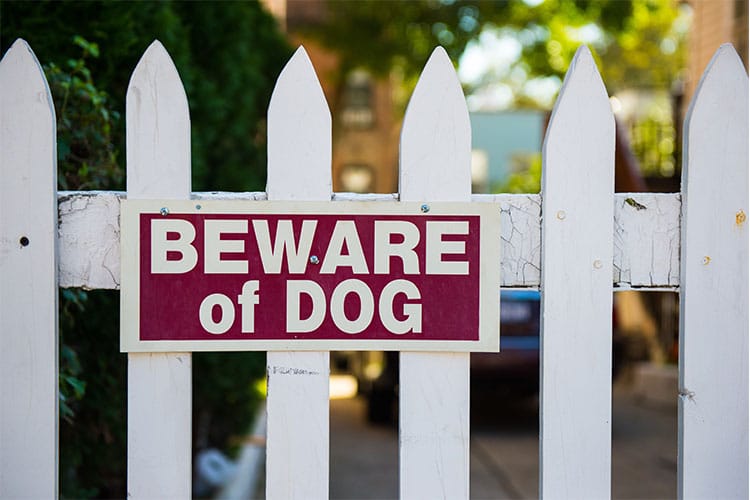
California, at surface level, may seem like it’s all sun and beaches, but beneath the palm trees and coastal charm is a reality that often goes unnoticed: the state leads the nation in dog bite cases.
With nearly 40% of households owning at least one dog, it’s no surprise that incidents are common. In 2022, more than 48,000 dog bites in California required emergency room treatment, averaging 125 visits per 100,000 residents. On top of that, insurers reported 2,417 claims in 2024, up from 2,104 in 2023, with payouts totaling around $143 million.
The impact reaches both victims who face medical bills and recovery, and owners who may suddenly be held financially and legally responsible. California law addresses this risk through strict liability, which makes owners accountable whenever their dog bites under the conditions set by statute.
In this article, we’ll explain how these laws work, what compensation may be available, and what steps both victims and owners should take after a dog bite occurs.

California law takes dog bites seriously and applies what’s known as a strict liability standard.
Under Civil Code § 3342, if a dog bites someone in a public place or while that person is lawfully on private property, including the dog owner’s property, the owner is automatically responsible for the damages. It does not matter if the dog never bit anyone before or if the owner had no reason to think the dog was dangerous.
This is different from states that use a negligence rule, where the victim must prove that the owner acted carelessly. In California, once a bite occurs under the conditions set by law, liability attaches without the need to show fault.
In California, a dog owner cannot escape responsibility by saying the dog had never bitten anyone before. Even the very first bite can make the owner fully liable for the victim’s injuries.
The law only protects people who are in a public place or who are legally on private property. That means someone delivering mail, doing their job, or visiting with permission is covered. Trespassers are not.
This law applies specifically to dog bites that break the skin. Other injuries, such as being knocked down, scratched, or jumped on, may still lead to claims, but they are handled under different legal rules.
California also places additional duties on owners after a bite occurs. Under Civil Code § 3342.5, once a dog has bitten a human, the owner must take reasonable steps to ensure the animal no longer poses a danger. If a dog bites twice, or if a trained attack dog inflicts serious injury, courts can order stricter measures, including removal of the dog from the area or even euthanasia in extreme cases.
Beyond human victims, California law (Civil Code § 3341) also protects livestock and poultry. If a dog kills or injures animals such as sheep, goats, horses, or chickens on someone else’s property, the owner is responsible for the damages. In some situations, the law even permits the immediate killing of the attacking dog without liability to the person who stopped the attack.
While California holds dog owners strictly liable for most bites, the law also recognizes specific exceptions. These carve-outs limit or remove liability in situations where it would be unfair to hold the owner fully responsible.
Strict liability only applies when the person bitten was lawfully present. If someone was trespassing on private property without permission, the owner typically does not owe damages for a resulting bite.
Police and military dogs acting under official supervision are generally exempt. For example, when a K-9 helps apprehend a suspect, investigates a crime, or defends an officer, the agency may not be liable for the bite. However, this protection does not apply if the person bitten was not involved in the situation that prompted the dog’s use.
If the victim provoked the dog, the owner may not be held liable. Provocation includes actions like teasing, hitting, tormenting, or otherwise inciting the animal to react defensively. Courts use a “reasonable person” standard to decide whether the victim’s conduct was likely to provoke a dog.

Under California law, provocation can be used as a defense in dog bite cases.
Whether or not provocation occurred is judged by how a reasonable person would view the situation. If the victim’s actions would reasonably be expected to cause a defensive or aggressive reaction from a dog, the owner may not be held liable for the bite.
Provocation can take many forms, some intentional and others unintentional:
Courts may also consider the age of the victim. Children are often treated differently, since they may not understand that their actions, like pulling ears or making loud, sudden moves, can provoke a defensive bite.
Put simply, provocation is not about intent. Even if the victim did not mean to upset the animal, what matters is whether the dog’s reaction was a reasonable response to the person’s behavior.
When a dog bites someone in California, the law requires a structured response to protect both public health and the community. The process is designed to balance rabies prevention, fair treatment of the animal, and accountability for the owner. Here’s what typically happens:
By law, any dog that bites a person must be quarantined for at least 10 days to rule out rabies. If the dog is properly licensed and vaccinated, quarantine may occur at home under the supervision of animal control. In other cases, it may be carried out at a shelter or veterinary facility, with costs usually the owner’s responsibility.
Every reported bite triggers an investigation by local animal control officers. They document the incident, check vaccination records, and assess whether the dog was at-large, provoked, or has a history of aggression. The investigation can result in citations, fines, or further legal proceedings against the owner.
If evidence shows that the dog poses an ongoing threat, authorities can seek to label it as “potentially dangerous” or “vicious” under California law. These designations carry serious consequences:
Owners are given notice and the opportunity for a hearing before a dog is permanently removed or euthanized. This ensures that decisions are based on documented evidence, not fear or speculation.
In short, what happens to the dog depends on the facts of the bite incident, the animal’s vaccination status, and any prior history of aggression. California’s approach prioritizes rabies safety while also creating pathways to restrict or remove dogs that pose repeated dangers.
California’s strict liability system creates a straightforward path for victims to recover compensation, but it also places heavy responsibility on owners to prevent incidents and respond properly if a bite occurs.
Acting quickly matters on both sides. Victims need to protect their rights and evidence, while owners must understand their legal duties and potential defenses.
Contact our California dog bite lawyers today for a FREE CONSULTATION to review your situation and get clear guidance on your next steps.

We proudly serve clients across California, including Los Angeles, San Diego, San Jose, San Francisco, Fresno, Sacramento, Long Beach, Oakland, Bakersfield, Anaheim, and many other communities. Whether you need a dedicated Los Angeles personal injury lawyer or legal representation anywhere else in the state, our team is ready to help.
Yes. Under California dog bite laws, owners are strictly liable if their dog bites someone in a public place or while lawfully on private property. The victim does not have to prove negligence or prior knowledge of aggression.
No. Unlike some states, California does not have a “one-bite” rule. Even a dog’s first bite can make the owner fully responsible for the victim’s injuries.
Victims may recover medical expenses, lost income, pain and suffering, emotional distress, and in some cases, future medical costs for ongoing treatment.
Yes. Owners can raise defenses such as trespassing or provocation. If the bite occurred while the victim was unlawfully on private property or provoking the dog, liability may be reduced or eliminated.
Most California dog bite lawsuits must be filed within two years of the incident. Acting quickly preserves evidence, strengthens your claim, and helps you meet the statute of limitations.
Sí. Hablamos español. We provide bilingual support so Spanish-speaking clients have full access to our attorneys.
Contact our California dog bite lawyers today for a FREE CONSULTATION






Thompson Law charges NO FEE unless we obtain a settlement for your case. We’ve put over $1.9 billion in cash settlements in our clients’ pockets. Contact us today for a free, no-obligation consultation to discuss your accident, get your questions answered, and understand your legal options.
State law limits the time you have to file a claim after an injury accident, so call today.